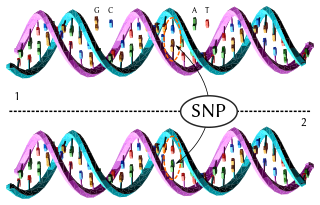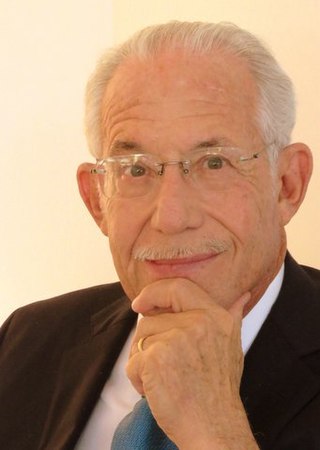Related Research Articles

Biotechnology is a multidisciplinary field that involves the integration of natural sciences and engineering sciences in order to achieve the application of organisms and parts thereof for products and services.

The Merck Group, branded and commonly known as Merck, is a German multinational science and technology company headquartered in Darmstadt, with about 60,000 employees and a presence in 66 countries. The group includes around 250 companies; the main company is Merck KGaA in Germany. The company is divided into three business lines: Healthcare, Life Sciences and Electronics. Merck was founded in 1668 and is the world's oldest operating chemical and pharmaceutical company, as well as one of the largest pharmaceutical companies globally.

In genetics and bioinformatics, a single-nucleotide polymorphism is a germline substitution of a single nucleotide at a specific position in the genome. Although certain definitions require the substitution to be present in a sufficiently large fraction of the population, many publications do not apply such a frequency threshold.

Pharmacogenomics, often abbreviated "PGx," is the study of the role of the genome in drug response. Its name reflects its combining of pharmacology and genomics. Pharmacogenomics analyzes how the genetic makeup of a patient affects their response to drugs. It deals with the influence of acquired and inherited genetic variation on drug response, by correlating DNA mutations with pharmacokinetic, pharmacodynamic, and/or immunogenic endpoints.

Human Genome Sciences (HGS) was a biopharmaceutical corporation founded in 1992 by Craig Venter, Alan Walton and Wally Steinberg. It uses the human DNA sequence to develop protein and antibody drugs. It had drugs under development to treat such diseases as hepatitis C, systemic lupus erythmatosis, anthrax, and cancer. It collaborated with other biotechnology and pharmaceutical companies for development partnerships and licensing.
deCODE genetics is a biopharmaceutical company based in Reykjavík, Iceland. The company was founded in 1996 by Kári Stefánsson with the aim of using population genetics studies to identify variations in the human genome associated with common diseases, and to apply these discoveries "to develop novel methods to identify, treat and prevent diseases."
Serono was a biotechnology company headquartered in Geneva, Switzerland. It was acquired by the German pharmaceutical company Merck in 2006. The company was founded as the Serono Pharmacological Institute by Cesare Serono in 1906 in Rome, Italy. A key step in its development was the discovery of a method of extracting urinary gonadotropins by Dr. Piero Donini. Serono was incorporated in 1987 and the holding company, Ares-Serono S.A., changed its name to Serono S.A. in May 2000.
This page provides an alphabetical list of articles and other pages about biotechnology.
Pascal Brandys is a French engineer and entrepreneur. He is a graduate of the École Polytechnique and received his M.S. in Economic Systems from Stanford University in 1982.
Charles Thomas Caskey, also known as C. Thomas Caskey, was an American internist who has been a medical Geneticist and biomedical researcher and entrepreneur. He was a Professor of Molecular and Human Genetics at Baylor College of Medicine, and served as editor of the Annual Review of Medicine from 2001 to 2019. He was a member of the editorial boards of the Proceedings of the National Academy of Sciences, Science, the Encyclopedia of Molecular Medicine and numerous other medical and scientific journals.
Personal genomics or consumer genetics is the branch of genomics concerned with the sequencing, analysis and interpretation of the genome of an individual. The genotyping stage employs different techniques, including single-nucleotide polymorphism (SNP) analysis chips, or partial or full genome sequencing. Once the genotypes are known, the individual's variations can be compared with the published literature to determine likelihood of trait expression, ancestry inference and disease risk.
Gualberto Ruaño is a pioneer in the field of personalized medicine and the inventor of molecular diagnostic systems used worldwide for the management of viral diseases. Ruaño is President and Founder of Genomas, a genetics-related company and now the bio-tech anchor of Hartford Hospital’s Genetic Research Center; he also serves as Director of genetics research at the Center.

Dietrich A. Stephan is an American human geneticist and entrepreneur who works in personalized medicine. Stephan is currently CEO of NeuBase Therapeutics and a General Partner in Cyto Ventures. Before NeuBase, Stephan was CEO of LifeX and Chairman and Professor of Human Genetics at the University of Pittsburgh. Prior, he was founding Chairman of the Neurogenomics Division at the Translational Genomics Research Institute. Stephan has founded or co-founded 14 biotechnology companies and advised many others. Stephan was co-founder of Navigenics, a personal genetics company.
Manteia Predictive Medicine S.A. was a start-up company created in November 2000 as a spin-off of Serono, a Swiss-based biotechnology company, now part of Merck-Serono, by private founders. Its aim was to provide preventive and curative treatment guidelines for common and complex diseases. These guidelines were envisaged as composed of two parts:

William A. Haseltine is an American scientist, businessman, author, and philanthropist. He is known for his groundbreaking work on HIV/AIDS and the human genome.

Eric Emil Schadt is an American mathematician and computational biologist. He is founder and former chief executive officer of Sema4, a patient-centered health intelligence company, and dean for precision medicine and Mount Sinai Professor in Predictive Health and Computational Biology at the Icahn School of Medicine at Mount Sinai. He was previously founding director of the Icahn Institute for Genomics and Multiscale Biology and chair of the Department of Genetics and Genomics Sciences at the Icahn School of Medicine at Mount Sinai.

Aurora Biosciences was a biotechnology company founded in 1995 in San Diego to commercialize fluorescence assays based on Roger Y. Tsien's discoveries concerning green fluorescent protein and its uses in basic research - work for which Tsien eventually won the 2008 Nobel Prize in chemistry along with two other chemists.

Mark S. Boguski was an American pathologist specializing in computational analysis and structural biology. In 2001, he was elected to both the U.S. National Academy of Medicine and the American College of Medical Informatics.
The Exploratory Science Center (ESC) is a pharmaceutical company based in Cambridge, MA. The disease agnostic research site was founded in 2016, and was led by Daria Hazuda until 2021. In late 2021 Juan Alvarez took on leadership as the interim head and Marc Levesque took on leadership in 2022. The Exploratory Science Center is a subsidiary of Merck & Co.

CRISPR Therapeutics AG is a Swiss–American biotechnology company headquartered in Zug, Switzerland. It was one of the first companies formed to utilize the CRISPR gene editing platform to develop medicines for the treatment of various rare and common diseases. The company has approximately 500 employees and has offices in Zug, Switzerland, Boston, Massachusetts, San Francisco, California and London, United Kingdom. Its manufacturing facility in Framingham, Massachusetts won the Facilities of the Year Award (FOYA) award in 2022. The company’s lead program, exagamglogene autotemcel, or exa-cel, was granted regulatory approval by the US Food and Drug Administration (FDA) in December 2023.
References
- ↑ Genset: 1989 Harvard Business School Case Study Paul A. Gompers, Amy L. Burroughs
- ↑ "Genset sets tone for global biotechnology financing" (PDF).
- 1 2 Genset Initial Public Offering Harvard Business School Case Study Paul A. Gompers, Jeffrey Anapolsky
- ↑ Capitalizing on the genome Nature Genetics 13, 1-1 (1996) Editorial
- ↑ Drug firms discuss linking up to pursue disease-causing genes The Wall Street Journal (4 March 1999) Robert Langreth, Michael Waldhoz and Stephen D. Moore
- ↑ Decoding the literature on genetic variation Nature Biotechnology 21, 21-29 (2003) Roger Coronini
- ↑ Pharmacogenomics Nature Biotechnology 18, 40-42 (2000) Technologies
- ↑ "Merck s'empare du suisse Serono pour 10,6 milliards d'euros". Les Echos (in French). 2006-09-22. Retrieved 2022-08-20.